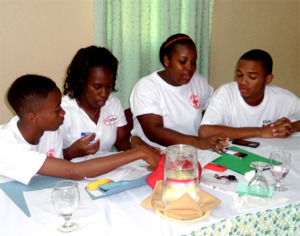NINETEEN young humanitarians of the Saint Lucia Red Cross are better equipped to contribute to the national society’s mandate of promoting a culture of non-violence and peace. This follows their participation in a three day training workshop to undertake their role as Agents of Behaviour through the International Red Cross and Red Crescent (IFRC) flagship programme, ‘Youth as Agents of Behavioural Change’ (YABC).

YABC was developed in 2008 by and for Red Cross and Red Crescent youth worldwide. The programme seeks to empower young persons to take up a leadership role in inspiring a positive transformation of mindsets, attitudes and behaviours within themselves and their community. Built on three pillars, namely: youth empowerment, operating from inner peace and reaching out to the community, participants are encouraged to develop their own perspective of issues, and to understand the responsibility and consequences of these perspectives.
During the training, participants were able to apply their knowledge and skills through ‘learning by doing’ sessions which focussed on raising awareness and understanding of issues related to the promotion of a culture of non-violence and peace. These included role-plays, games, sharing of experiences and guided discussions.
According to training facilitator, Romane Knight, of the Jamaica Red Cross: “The training was successful as participants were able to take the information shared, internalize it and apply it to the local context.”
Commenting on the contribution of YABC to St Lucia, Knight explained: “The issues of non-discrimination, social inclusion and resilience can be applied to the challenges faced by different groups in St. Lucia, including out-of-school youth, young teenagers engaging in risky sex, and as well, the lives of the participants, themselves.”
One of the highlights of the workshop was the presentation on violence. The session included the International Federation of Red Cross and Red Crescent’s (IFRC) definition of violence and its strategic response to violence. Amongst these is the promotion of social inclusion through programmes such as YABC. Participants also reviewed global statistics on violence, including suicide and the implications of societal expectations on the rate of male suicide.
Jill DeBourg of the Caribbean Regional Representation Office (CRRO) explains that, “the YABC methodology provides a good platform to engage young people to influence positive behaviour. “ According to DeBourg, youth are ideal for fueling change and the challenges they face, whether bullying in school or violence in the community or household.
For the participants, the workshop encouraged them to move from their comfort zone through critical reflection on thematic issues such as non-discrimination, negotiation, and empathy.
Kisna Alexander, a participant of the training, believed that “YABC training served as a real eye-opener, as topics discussed tied in directly with our everyday lives. It taught me that no one should be taken for granted.”
Omegha Gaillard summed up her experience with this famous quote from Mahatma Ghandi: “I object to violence because when it appears to do good, the good is only temporary; the evil it does is permanent.”
One of the few males at the workshop, Kevin Edward said: “I learnt to reflect on the many things that I overlook on a day to day basis, but yet these things mean so much to others. On a personal level, the training brought out certain qualities that I had never before taken note of.”
In an environment where youth are both perpetrators and victims of violence, YABC contributes at a personal level, to a life-long learning process of deepened self-confidence and self-resilience to promote inner change. The key messages of the YABC training are respect for diversity, non-discrimination, active listening and social inclusion as youth are encouraged to embody the seven Fundamental Principles of Red Cross, and to ‘walk the talk’.
YABC training was funded by the Japanese Red Cross through it Caribbean Comprehensive Disaster Management Project.




![Simón Bolívar - Liberator of the Americas [Photo credit: Venezuelan Embassy]](https://thevoiceslu.com/wp-content/uploads/2025/12/Simon-Bolivar-feat-2-380x250.jpg)



